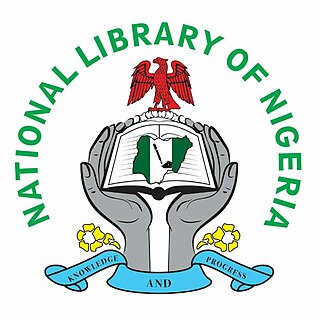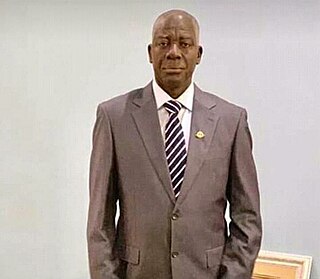Related Research Articles

The Federal Trade Commission (FTC) is an independent agency of the United States government whose principal mission is the enforcement of civil (non-criminal) antitrust law and the promotion of consumer protection. The FTC shares jurisdiction over federal civil antitrust law enforcement with the Department of Justice Antitrust Division. The agency is headquartered in the Federal Trade Commission Building in Washington, DC.

Shehu Usman Aliyu Shagari was a Nigerian politician who was the first democratically elected president of Nigeria, after the transfer of power by military head of state General Olusegun Obasanjo in 1979, which gave rise to the Second Nigerian Republic.

Kaduna State is a state in the northwest geopolitical zone of Nigeria. The state capital is its namesake, the city of Kaduna, which was the 8th largest city in the country as of 2006. Created in 1967 as North-Central State, which also encompassed the modern Katsina State, Kaduna State achieved its current borders in 1987. Kaduna State is the fourth largest and third most populous state in the country, Kaduna State is nicknamed the Centre of Learning, owing to the presence of numerous educational institutions of importance within the state such as Ahmadu Bello University.

Katsina State is a state in the northwestern geopolitical zone of Nigeria. Katsina State borders the Republic of Niger to the north for 250 km and the States of Jigawa for 164 km and Kano to the east, Kaduna to the south for 161 km and Zamfara to the west. States. Nicknamed the "Home of Hospitality", Both the state capital and the town of Daura have been described as "ancient seats of Islamic culture and learning" in Nigeria.

Umaru Musa Yar'Adua ; 16 August 1951 – 5 May 2010) was a Nigerian politician who served as the president of Nigeria from 2007 until his death in May 2010. He won the Nigerian presidential election held on 21 April 2007, and was sworn in on 29 May 2007.
Articles related to Nigeria include:

The National Library of Nigeria came into operation in the mid-1960s with the enactment of the National Library Act of 1964 which was later replaced by Act No. 29 of 1970. Before the passage of the National Library Act, a series of educational conferences conducted in Ibadan served as the intellectual basis for the creation of a network of libraries funded by the federal government to provide accessibility of educational materials to Nigerians. A government advisory committee was later created concerning the necessity to develop a local repository of knowledge. The committee was charged with finding a way to aid the government in bringing to prominence the intellectual foundations of its policies, creating a national bibliographic center, and providing an arena for the promotion of knowledge. The committee was the first major formal body that called for a National Library as part of its recommendations. The government accepted the demands of the advisory committee and undertook the necessary steps to build a National Library.
Consumer protection is the practice of safeguarding buyers of goods and services, and the public, against unfair practices in the marketplace. Consumer protection measures are often established by law. Such laws are intended to prevent businesses from engaging in fraud or specified unfair practices to gain an advantage over competitors or to mislead consumers. They may also provide additional protection for the general public which may be impacted by a product even when they are not the direct purchaser or consumer of that product. For example, government regulations may require businesses to disclose detailed information about their products—particularly in areas where public health or safety is an issue, such as with food or automobiles.

Railway stations in Nigeria include:

In Nigeria, Sharia has been instituted as a main body of civil and criminal law in twelve Muslim-majority states since 1999, when then-Zamfara State governor Ahmad Sani Yerima began the push for the institution of Sharia at the state level of government. A "declaration of full Sharia law" was made in the twelve states in that year, and the states created Islamic legal institutions such as a Sharia Commission, and Zakat Commission, and a hisbah. According to some critics, the adoption of Sharia law violates Article 10 of the Nigerian constitution guaranteeing religious freedom.

The National Drug Law Enforcement Agency (NDLEA) is a federal law enforcement agency in Nigeria under the Federal Ministry of Justice charged with eliminating the growing, processing, manufacturing, selling, exporting, and trafficking of hard drugs. The agency was established by Decree Number 48 of 1989. The NDLEA is present in international airports, seaports, and border crossings. The NDLEA also targets the leaders of narcotics and money laundering organizations.
Emmanuel Dangana Ocheja is a Nigerian Senator who represented Kogi East senatorial district in the National Assembly, and a member of the All Progressives Congress.

The National Commission for Museums and Monuments (NCMM), also referred to as National Museum of Nigeria was Founded in 1979 by the Federal Government of Nigeria with decree 77 of 1979 to be in charge of the collection, documentation, conservation and presentation of the National Cultural properties to the public for the purposes of Education, Enlightenment and Entertainment. This decree recognized the National Commission for Museums and Monuments as a replacement for both the Federal Department of Antiquities of Nigeria and the Antiquities Commission. The decree has since been substituted in 1990 for the NCMM ACT, CAP 242 of the law of Federal Republic of Nigeria 1990.

Lesbian, gay, bisexual, and transgender (LGBT) persons in Northern Nigeria face unique legal and social challenges not experienced by non-LGBT residents. Federal law prohibits all forms of homosexual activities and prescribes up to 14 years imprisonment for those found culpable. While the Maliki form of Shari'a law applied in 12 states have lesser penalty for unmarried persons, it prescribes the death penalty for married individuals.
The following lists events that happened during 2016 in Nigeria.

Yusuf Magaji Bichifwc is a Nigerian security personnel who served as the director-general of the State Security Service from 2018 to 2024.
The Ahmadu Bello University (ABU) is a public research university located in Zaria, Kaduna State, Nigeria. It was opened in 1962 as the University of Northern Nigeria. The university has four colleges, three schools, 18 faculties, 110 academic departments, 17 centres, and seven institutes with over 600 professors, about 3000 academic staff and over 7000 non-teaching staff. The university has over 400 postgraduate programmes reflecting its strife to become a postgraduate studies-centred university. The university operates from two campuses in the ancient cosmopolitan city of Zaria, the Samaru Campus where the Senate Building and most of the faculties are located and the Kongo Campus, hosting the faculties of Law and Administration. It has been adjudged to be the largest university in Sub-Saharan Africa, in terms of land occupied, owing to the numerous buildings it has.
The End Bad Governance protests, widely known by the hashtags #EndBadGovernance or #EndBadGovernanceInNigeria, were a series of decentralized mass protests in Nigeria that mainly occurred from 1 August to 10 August 2024, triggered by the rising cost of living in the country.
References
- ↑ Dickson (psybug), Tonye. "Federal Competition and Consumer Protection Commission". Federal Competition and Consumer Protection Commission. Retrieved 2020-09-09.
- ↑ "FTC Signs Updated Memorandum of Understanding with Nigerian Consumer Protection and Criminal Enforcement Authorities". Federal Trade Commission. 2020-10-29. Retrieved 2021-10-02.
- ↑ "Review of the guidelines issued by the FCCPC". Businessday NG. 2020-02-27. Retrieved 2020-09-09.
- ↑ Amuchie, Kizito (29 September 2021). "FCCPC tasks oil marketers on anti-competitive conducts – SundiataPost" . Retrieved 2021-10-03.
- ↑ Alu, Kingsley (2021-09-24). "Patients Bill Of Rights: FCCPC Engages Doctors Over Implementation". Leadership News - Nigeria News, Breaking News, Politics and more. Retrieved 2021-10-03.
- ↑ "Home". Archived from the original on 2020-07-27.
- ↑ Baxter, Rashid (2024-09-24). "Tech giants must take Nigerian enforcer seriously, ex-head says". Global Competition Review. Retrieved 2024-09-24.
- ↑ Dzirutwe, Macdonald (2023-12-27). "Nigerian competition watchdog fines British American Tobacco $110 mln". Reuters. Retrieved 2024-07-20.
- ↑ Bala-Gbogbo, Elisha; Dzirutwe, MacDonald (2024-07-19). "Nigeria fines Meta $220 million for violating consumer, data laws". Reuters. Retrieved 2024-07-20.
- ↑ "President Tinubu Appoints New Chief Executive Officer/Executive Vice-Chairman of FCCPC – the Statehouse, Abuja".